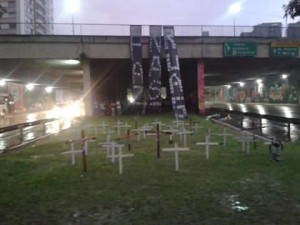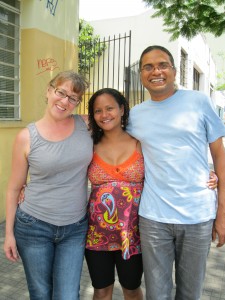We had a good day.
The children and teens were exceptionally open. We had meaningful conversations with some and the others were just happy to spend time with adults. There has been a drastic drop in the number of social work agencies in the streets and consequently, the children have fewer interactions with adults. Even though the children and teens would never admit it, they do crave for adult attention. Today, they were open about their desire for adult company and we openly enjoyed their company. This is why it was a good day.
As we were on our way home, we ran into Alex. He is 15 years old, but no one would believe it. He is small for his age. He was carrying a huge backpack perhaps too big for his size which made him look a little awkward. He was walking briskly away from the area as it was full of police. We suspected that the heavy backpack contained some paint thinner which he was selling. Alex has always been a loner. It is hard to get him into a conversation. Most of the time, he doesn’t engage in any activity with us. He is an extreme introvert. Today, however, he was different. When he noticed us, he came to us and asked to do an activity with us. We were a little taken aback. Alex never makes such requests. Even though we were ready to call it a day, we decided that it was worth extending our time just to spend some time with Alex.
Recently we have been trying to do more art with the children in the streets. Most of them have responded very positively to this. They are partial to water colors. We were expecting things to turn messy but to our pleasant surprise, they do a good job with their painting. Alex wanted to paint a horse today. He asked if we could draw him a picture of a horse. The only artist in the group is Mary and she drew a lovely horse. Alex happily chose the colors and started working on it. We also noticed that Alex had a horse keychain. We asked him if he ever seen a horse before. He said that he rode one when he was living on a small ranch in the outskirts of the city. He told us that it belonged to his family. This was a little strange because we know Alex’s family. They were not a family that could ever own or even rent a small ranch. They were extremely poor.
Alex alternates between the streets and his grandmother’s house. She lives in one of the worst neighborhoods in center. It is an area riddled with drugs and violence. Unfortunately this is the only place where she can afford to rent a tiny studio apartment which she shares with her four grandchildren. To call this place an apartment is an exaggeration. It is an old historic building that is literally falling apart and the so-called apartments are really just rooms with bathrooms. Most of the renters are drug addicts and dealers. Crime and violence are an everyday occurrences and the children have grown accustomed to them. The grandmother makes very little money doing odd jobs to support herself and the children. Mary has met her and she found the grandmother to be a kind person with a sense of humor. However, she is limited in what she can do for the children. She has no one to help her and most of her grandchildren are under fifteen. The youngest is a girl and she is 9 years old. Alex has another younger brother who is thirteen who also alternates between the streets and his home.
We enquired once again about the ranch. Alex smiled and told us that he was lying. It did not belong to his family. However, he really rode horses at the ranch but it belonged to a children’s shelter. In São Paulo, children’s shelters also function as orphanages. Alex and his brother were sent there soon after their mother’s death. He was about ten when it happened. We did not really understand the details of his story but it appears as if his mother suffered a sudden cardiac attack and died before the paramedics arrived. Unfortunately, he remembers vividly that the ambulance took forever to arrive even though they lived three blocks away the hospital. His grandmother could not take care of all the children and consequently he and his brother were sent to the shelter. We asked about his father. He told us that he remembered very little of his father. All he remembered was that his father was a crack addict. His father eventually died but Alex never had a relationship with him.
In the course of our conversation, Alex spoke and acted like a young ten year old. It was the age when he lost his mother. He had a little bit of a cold and I gave him a piece of tissue and he blew his nose in it and tried to give it back to me. I told him that this was a gift that he should keep for himself and he started laughing. At that moment, we all forgot that Alex was selling paint thinner and he was sleeping in the streets. We forgot that he was usually closed to conversations and a recluse. He forgot that he was alone and an orphan. We sat around and talked like an odd-looking family on the floor of a square in the center. We felt a strong love for him and we believed that he sensed it as well. It was the first time that Alex had a long conversation with us. He started asking questions about animals and different stuff; not unlike the questions a young child would ask his parents. Perhaps Alex never had the chance to ask such questions before. Perhaps the adults in his life did not have the time or energy to answer such questions. God wants to answer his questions and I am grateful that He used us as His mouthpiece to do this.
We went home happy that we stayed longer today. We pray for many more moments like this with Alex.



